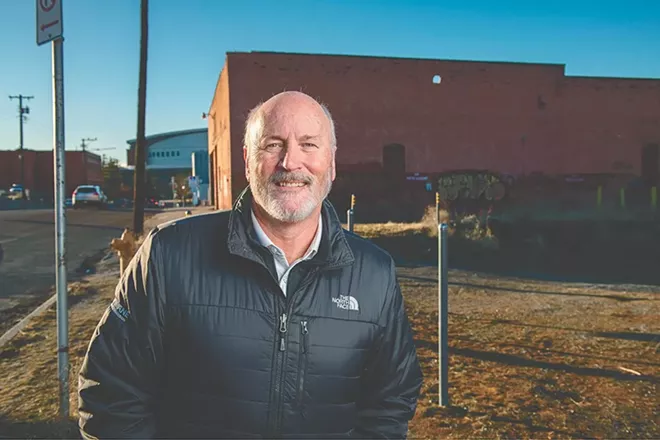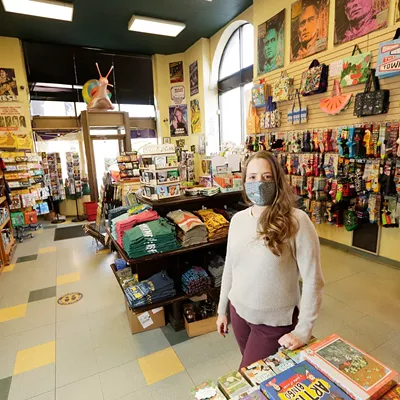
Sawyer is not a doomsayer. He's the opposite. He's the ceaseless optimist, the twinkle-eyed salesman perpetually selling Spokane on the magic of the world of sports and selling the world of sports on the magic of Spokane.
He's been damn good at his job, too — recruiting countless sporting events to come to Spokane, and cheering on the cascade of economic prosperity that flowed out to restaurants, stores and hotels.
And lately, for him, it seemed like every one of his dreams were coming true, culminating with the vision he'd been pursuing for the last 25 years — a massive Sportsplex capable of attracting huge economic events to Spokane.
"I was riding high," Sawyer says. "We broke ground on the Sportsplex. We were seeing that moving forward. It was a really exciting time in the design phase, and then we were moving into a period where we were going to have a community full of sports. It was just a real high for me in my own career in sports.
"And then to have it all collapse..."
On March 11, the Pacific Northwest Qualifier was canceled, the volleyball tournament that Sawyer often bragged had a larger economic impact on the community than either Hoopfest or Bloomsday. A big middle school basketball tournament was postponed by the order of the Spokane health officer.
"They had real concerns because of how many teams, because it's a state tournament, because of how many coming over from the West Side from high-risk areas, so they shut them down," Sawyer says. "It was just snowballing."
The entire March Madness basketball tournament was canceled the next day.
Bit by bit, the Spokane Sports Commission has had to "X" out one calendar event after another, like a major international taekwondo event in May.
"For nothing else, I don't know who can travel internationally," Sawyer says.
Last year, when the Inlander dug deep into the viability of the Sportsplex, Sawyer would show us all these charts and tables and research studies showing how vibrant sports tourism was. The sports tourism industry that grew during the recession.
But all these studies assumed that volleyball tournaments would still, well, exist. And even if, somehow, the volleyball tournaments were still being held, how exactly, would Spokane see the economic impacts, if the hotels are mostly closed and the restaurants are mostly closed?
"I know for a fact that the Grand Hotel — which is the only Davenport that's open right now — they have 12 rooms booked tonight," Sawyer says. "So what does that mean? And how does that translate to everybody who works in the tourism industry?"
In particular, what does that mean for everybody who works for the Spokane Sports Commission?
"I'm driving right now," Sawyer says over the phone. "I'm coming back from a finance meeting. Basically, we're just looking at ways to cut our budget so we can stay afloat as an organization... It's somber. you know, there's no question, we all worked really really hard to get these things to come into the community. And you basically have to say, we can't do them."
So lately, in the isolated quiet that has descended upon so many of us, Sawyer has time to think.
"You get down to the human side of it: In the NCAA, you have seniors and who, you know — this is their-once-in-a-lifetime and, you know, not being able to play and all that," Sawyer says. "I mean, there's just a million stories that circle around that."
He has time to read. All those articles about sports tourism that he's saved over the years, he's pouring through them, reading information on the industry. He says he just talked to a Sports Illustrated reporter who told him that everyone else in the sports tourism industry is doing the same thing.
They can read. There's time now. But the cruel Twilight Zone twist is that, in this moment, all that research and all those expert opinions are obsolete, an artifact of a past where people were allowed to attend big sporting events.
At least, for now.
Still, the Sportsplex isn't being abandoned. Ironically, all the delays and challenges the Sportsplex faced getting built might have been blessing. By the time the Sportsplex opens, a year from now, the plague will likely have passed.
"I'm the Pollyanna," Sawyer says. "I'm the half-cup-full type guy."
And if there's not much optimism in the present right now, Sawyer looks to the future.
"What' s the outcome from all of this? A clear understanding of how valuable it was what we do in tourism and sports development and its impact on the economics of our community," Sawyer says. "We're going to get through it and the Sportplex and the Arena are going to be filled up with screaming sports fans before too long... We know what we can do. We've proven what we can do. We've shown what we can do."
And when the gates open, and it's safe for fans again, Sawyer says, he "can turn loose the racehorses again" and start competing for the big sporting events that can resurrect Spokane's economy.
























